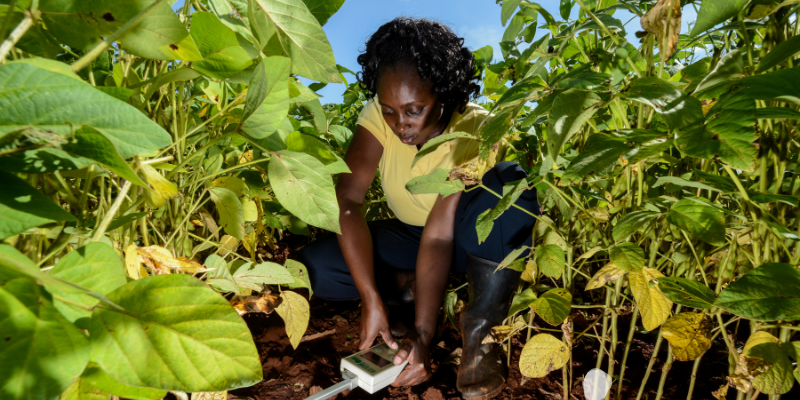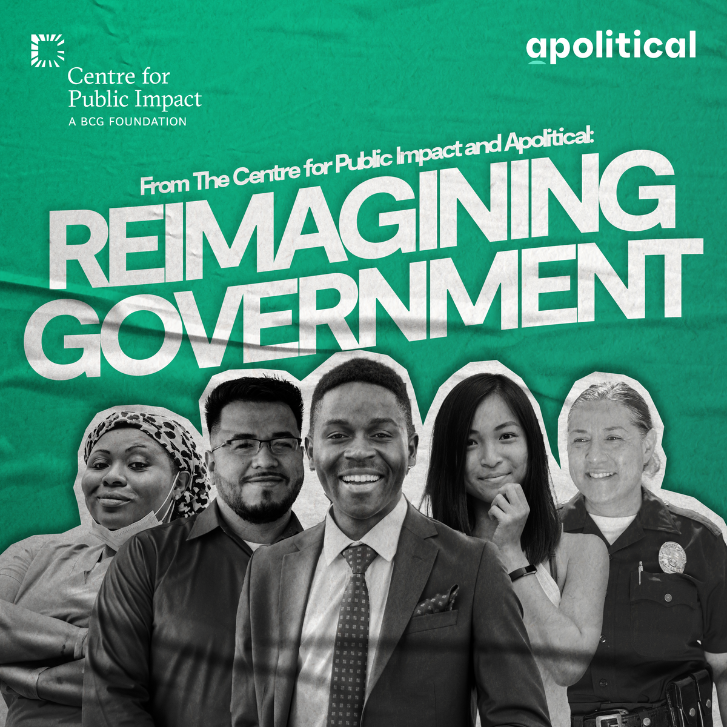

Reimagining Government episode 6: Global development
Article highlights
🎙️ The 6th episode of #ReimaginingGovernment by @CPI_foundation & @Apoliticalco is live! Listen to how @SanjayPurohitM @gquaggiotto @JulesMwabe & Roopa Sahu are reimagining #globaldevelopment.
Share article🤔 What might it look like to reimagine governance in #globaldevelopment where the Global South and Global North converge? Listen to ep.6 of #ReimaginingGovernment by @CPI_foundation & @Apoliticalco to hear from people doing development differently.
Share article“To those in the Global South, we have to give them more decision-making opportunities. How do we learn and glean off each other towards common agendas?" 🗣️🤝 @JulesMwabe on ep.6 of #ReimaginingGovernment.
Share article🎙️ Reimagining Government
In partnership with Apolitical, this six-part podcast explores radical new approaches to addressing global issues such as the climate crisis, equitable healthcare provision, and rebuilding trust with marginalised communities. By speaking with public servants and politicians at the heart of government, we’ll shine a light on how to reimagine government so it works for everyone.
What might it look like to reimagine governance in global development where the Global South and Global North converge? In the sixth episode of the Reimagining Government podcast, we shine a light on the people rethinking practices and challenging power dynamics in global development.
Our hosts, Morag Mwenya Neill-Johnson and Javiera Godoy, are Interim Co-directors of the Centre For Public Impact’s Global Development Initiative. They have spent the past decade working with international governments, non-profits, and cities to push for more equitable development practices.
“Let’s explore what it might look like to challenge power dynamics, embrace complexity, include more people in the conversation, and discuss how these lessons can inform similar efforts in reimagining global development” - Morag Mwenya Neill-Johnson
Their discussion points have been broken down into the following:
00:00 - 03:58 - Introduction
03:59 - 14:18 - Sustainable solutions require local knowledge and engagement
14:19 - 26:19 - The importance of innovation in global development
26:52 - 35:18 - Telling the stories of people in Odisha, India
35:27 - 45:58 - Collaborating across levels and sectors to scale solutions effectively in India
45:59 - 49:12 - Conclusion
Sustainable solutions require local knowledge and engagement
In global development, the challenges, priorities, and goals differ significantly from context to context in each sector and level. So how can we shift power dynamics and support locally owned solutions founded on the knowledge of those working on the ground who best understand the situation?
Julie Mwabe is a Team Lead in Global Advocacy at Global Partnership for Education and was formerly Gender Advisor to the Executive Office of the President of Kenya. She believes tapping into local solutions and collaborating across sectors is crucial when addressing global development challenges.
“How do we get different sectors to work together so that if it’s education, it’s not just an education thing? If it’s a gender [thing], it’s not just the ministry of gender. But then looking at [the] children, at your core and at your centre, so that you are able to look at them in their totality.” - Julie Mwabe
Mwabe cites the example of Wangari Maathai, a Kenyan political activist who won the Nobel Peace Prize in 2004. Having identified the link between education, housing, safety and nutrition issues, Maathai founded the Green Belt Movement.
 Georgina Smith / CIAT
Georgina Smith / CIAT
The movement is an indigenous grassroots organisation focusing on planting trees, environmental conservation, and women's rights. The movement has planted over 51 million trees and trained over 30,000 women in forestry, food processing, bee-keeping and other trades, enabling them to earn income and preserve natural resources. Taking such a multi-sectoral approach, has provided fuel, food, shelter, and income to help Kenyan women overcome challenges.
“At the gateway of society and development, when you empower a woman, you empower her community. There’s so many intergenerational benefits to come of that.” - Julie Mwabe
This initiative also demonstrates the benefits of collaborating closely with local communities. Mwabe believes that to bring about sustainable change, we should directly involve the communities at the heart of the issues.
“To those in the Global South, we have to give them more decision-making opportunities, speak less for them, but allow them to speak for themselves [and] provide them platforms. How do we work together and learn and glean off each other towards common agendas so that we are also stepping away from what we know and across sectors to move that agenda forward?”- Julie Mwabe
The importance of innovation in global development
Innovation is critical to solving new and unfamiliar challenges in an ever-changing world.
Giulio Quaggiotto was previously Head of Strategic Innovation at the United National Development Programme and managed the Jakarta Lab of the UN Global Pulse. As he defines it, innovation is about creating and implementing ideas that deliver value.
While there was initially much enthusiasm and adoption of innovation in the global development sector, Giulio reflects an increasing feeling that more is needed.
“Maybe money flows easily, but power does not. And so there is an increasing realisation: if you’re talking about, really, innovation in development and in the development sector, you’re not talking about adopting shiny new tools or establishing labs. You’re talking about redesigning, fundamentally, a system that was designed for a different era, for a different purpose. It is not in line with the challenges that are facing us.” - Giulio Quaggiotto
When using innovation to tackle global development challenges, governments should consider what’s already happening on the ground and how they can empower communities to advance the tools they already possess.
“The development sector is still struggling to acknowledge and recognise that things are happening already, driven locally by local needs and local expertise actually are more worthwhile to support often time than completely new initiatives coming from the outside.” - Giulio Quaggiotto
Challenges may be deep-rooted and systemic, based on historical inequalities. However, these foundational struggles require long-term solutions that rewire organisations and entire systems to reflect today’s realities.
For Giulio, a key role for innovation is to ask how we build that organisational will to transform. This requires a different perspective from the individual that challenges established practices. As Giulio describes, dismantling a system may set the individual up as antagonistic or directly in conflict with the system.
“...in a sense, your whole identity, is predicated on being the one who challenges the system to try to actually do things that are strange, innovative things I’ve not heard before...If you take this more, what we would’ve ended up calling systemic or strategic approach to innovation, you actually need to bring the system with you, which means you need to be the most helpful person in the room.” - Giulio Quaggiotto
One good starting point for innovating effectively is for governments to seek out the strengths of the existing systems and assets. In the case of the UNDP, they have established a network of accelerator labs with a role called Solution Mapper. People in this position are dedicated to identifying local communities and ecosystems for talent, knowledge, and solutions to support planning and implementing wider-scale innovation.
By taking a systemic rather than departmental lens, innovation can also encourage positive change, tackling silos within government structures. Giulio gives the example of climate change.
“All the other aspects of climate that are not exclusively environment related tend to be lost by the way that bureaucracies and organisations are organised into small silos.” - Giulio Quaggiotto
However, by challenging this logic, considering the root cause of the problem and how that impacts other sectors, and working backwards from there to foster institutional redesign, governments can move away from rigid bureaucratic systems and towards more dynamic and transformational approaches.
Some global development challenges may seem impossible, but we can see real change by embracing the complexities of collaborating between governments, their systems, and stakeholders.
Telling the stories of people in Odisha, India
What does it look like to reimagine government in more densely populated areas in the Global South?
 People on a beach in Puri, Odisha. Photo by Sudeshna Sahoo on Unsplash.
People on a beach in Puri, Odisha. Photo by Sudeshna Sahoo on Unsplash.
One Indian state leading the way in its efforts to amplify citizens' voices to understand the impact of governance initiatives and the stories behind them is the Government of Odisha (formerly Orissa).
Quantitative data can be a powerful tool for monitoring the population, but we must also consider the qualitative impact of policy on individuals.
Roopa Sahu is a member of the Secretary of the Poverty and Human Development Monitoring Agency in the Government of Odisha, India. The organisation works closely with citizens to collect their stories to inform future work.
“It is not statistics, it is stories. So when we made this solid posturing about ourselves that from now on the Poverty and Human Development Monitoring Agency in Odisha, we’ll talk about the way every intervention of government towards poverty, elevation eradication, and welfare for human development has impacted the individual.” - Roopa Sahoo
By asking individuals questions like ‘how is your life now?’ and ‘how was your life before?’, the agency found that capturing stories better highlighted the reality of lived experiences.
This was demonstrated when looking into the weaver population in India. While the numerical data could shed light on the quantity of the weavers, it could not explain accessibility and availability factors. After collecting 3,000 stories, the team observed the practical requirements of having a loom - specific lighting conditions, season, weather - directly affecting upcoming policy.
Effectively communicating these stories to policymakers is vital in the Poverty and Human Development Monitoring Agency’s work. More recently, the agency has introduced visual elements, capturing more than 10,000 pictures documenting everyday life in communities.
Using qualitative data in Odisha to more thoroughly assess the complexities of social conditions demonstrates the importance of listening to communities. In addition, storytelling can play a vital role in shaping policy and public services that better respond to people’s needs.
Collaborating across levels and sectors to scale solutions effectively in India
As one of the world’s most populous countries, there is a real challenge for governments in India to keep up with its scale and diversity. So how can governments best solve problems at scale in India?
Societal Thinking is an organisation that explores different pathways to induce exponential change by looking at problems through different frames, designing platforms for scale and leveraging exponents to build faster and better. As its Chief Curator, Sanjay Purohit, explains it, “[...] we have to imagine a network or an ecosystem of solutions that can respond to different elements of the society in their own context, such that we are able to address the problem at a societal scale from different lenses.” - Sanjay Purohit
When looking at a growing society, the issues that arise permeate many different parts of people’s lives, from health and education to climate. Because of this, Purohit believes we must look at solutions singularly but as systems of solutions working together to cover wide-reaching challenges. When planning, it is essential to consider how the issues will evolve as the scale increases and create a shared infrastructure that fairly distributes knowledge and resources.
“If we need to solve something at the societal scale, we need to essentially not distribute solutions, but distribute the ability to solve, distribute an infrastructure that can help many people solve, and create an ecosystem of solvers who can solve the problem in their respective societies, in their respective context, in a unified way.” - Sanjay Purohit
Complex challenges may develop faster than solutions. Sanjay suggests governments need to bring three capabilities together to solve for this and scale solutions effectively.
Firstly, the ability to understand the community and the reality of the situation on the ground. Civil society organisations are uniquely well suited for this. Secondly, the different players who are skilled at innovation and experimentation. Finally, bringing the entire resource base of the country or society at scale, which is where government plays a hugely important role.
With the wide-reaching challenges that national problem-solving brings, collaboration and leveraging the different strengths across government, civil society, and philanthropic and private players is essential for better government.
Conclusion
There are a wide range of approaches to reimagining government on a global scale, but there is no one specific one-size-fits-all solution. Each community has its own strengths and challenges, and each requires a unique solution that centres their experiences.
However, collaboration between government, public and private sectors, and those on the ground is crucial in enacting widespread change. This episode’s changemakers have demonstrated the imaginative ways in which governments and the development sector are evolving and adapting to achieve a new vision for governance that benefits all.

🎙️ Reimagining Government
This six-part podcast explores radical new approaches to addressing global issues such as the climate crisis, equitable healthcare provision, and rebuilding trust with marginalised communities.
By speaking with public servants and politicians at the heart of government, we’ll shine a light on how to reimagine government so it works for everyone.
You may also be interested in...


Reimagining Government episode 4: A more equitable government
